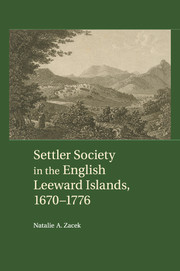Book contents
- Frontmatter
- Contents
- List of Tables
- Acknowledgments
- Map
- Settler Society in the English Leeward Islands, 1670–1776
- Introduction
- 1 The Challenges of English Settlement in the Leewards
- 2 Irish, Scots, and English
- 3 Managing Religious Diversity
- 4 Sex, Sexuality, and Social Control
- 5 Political Culture, Cooperation, and Conflict
- Conclusion
- Bibliography
- Index
Conclusion
Published online by Cambridge University Press: 05 July 2011
- Frontmatter
- Contents
- List of Tables
- Acknowledgments
- Map
- Settler Society in the English Leeward Islands, 1670–1776
- Introduction
- 1 The Challenges of English Settlement in the Leewards
- 2 Irish, Scots, and English
- 3 Managing Religious Diversity
- 4 Sex, Sexuality, and Social Control
- 5 Political Culture, Cooperation, and Conflict
- Conclusion
- Bibliography
- Index
Summary
On Friday, January 5, 1753, John Barbot, a twenty-five-year-old attorney-at-law, was arraigned at the Court of Oyer and Terminer in Basseterre for the murder of Matthew Mills, Esquire. Barbot, the court alleged, had shot Mills at sunrise on the shore of Frigate Bay, near the salt ponds on the desolate and sparsely populated eastern end of St. Kitts. The prosecution, led by John Baker, solicitor general of the Leeward Islands, made its opening statement: On November 7, 1752, on the occasion of the sale of a piece of property called Bridgwater's Estate, on the nearby island of Nevis, Barbot had quarreled with Mills about a matter relating to the terms of sale of the estate. Several witnesses claimed that they had heard Barbot several days later, on November 10, declaring to a gathering of people in Basseterre that “there was a certain gentleman in this island, whom he would either kill or be killed by in less than a fortnight.” Baker stated that several witnesses had seen Barbot practicing shooting a pistol later that same week and that others had seen him hastily drawing up an impromptu will at Hugh O'Donnell's tavern in Charlestown, Nevis, on November 18. On the following day, November 19, John McKenley, overseer of Spooner's Plantation near Frigate Bay, was, as he testified, awakened at daybreak by a young male slave named Coomy, whom he recognized as the property of Matthew Mills, being “the boy who always ran with the deceased.”
- Type
- Chapter
- Information
- Settler Society in the English Leeward Islands, 1670–1776 , pp. 257 - 266Publisher: Cambridge University PressPrint publication year: 2010



